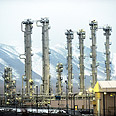
Carrying a big stick
Op-ed: The more we talk about striking Iran, the less room we have for acting against Tehran
Ironically, it has become clear that these vocal warnings have created the opposite of our desired effect and lessened the likelihood that we can employ military might to defend our country. History has taught us that it is best not to telegraph our plans, especially if we plan on using military action when necessary to protect the citizens of Israel.
By this point, we’ve all been endlessly bombarded with the message that Israel and the Western world should be extremely alarmed by the prospect of a nuclear Iran. Despite the years that have gone by, and the ever-shifting political scenery of the Middle East, Iran’s ambitions have remained the same. It is now obvious to all that the Iranian leadership harbors dreams of grandeur and hopes to revisit the glory days of the Persian Empire – this time as a world-dominating nuclear power.
Most people are aware of Iran’s nuclear program and the threat it poses to not only Israel, but to Europe and the United States as well. On the other hand, those following the development of the Iranian threat over the years know all too well that the efforts to date by the international community to stop or slow the development of this program have not achieved the desired results.
The so called "crippling sanctions" have barely inflicted a paper cut on the Ayatollahs and the famous Stuxnet virus that may or may not have originated in Israel, along with a similar virus that is said to have struck Iran this month, have only mildly succeeded in setting back Iran's sinister ambitions.
Official statements hurt us
There is some good news within this ominous forecast – we have faced such threats before and we now how to best combat them. In 1981, and again in 2007 (according to foreign news reports), Israel faced the prospect of a well-trained enemy military months or a just a few years away from a nuclear weapon. Both in Osirak in Iraq and in Al-Kibar in Syria the Israeli government understood that it could not rely on foreign diplomatic or military action to neutralize a potential existential threat to the Jewish State.
Speculation aside, the big question remains. What use is talking about the actions that Israel may or may not take with regards to Iran’s nuclear reactor? If what many believe will be an inevitable attack on Iran’s nuclear facility does occur, the biggest difference between that operation and the ones on Osirak and Al-Kibar will be the absence of the element of surprise.
In both prior instances, the attacks were carried out in complete secrecy and came as an absolute shock to the target. There were no TV news headlines on the topic in the months leading up to the attack and you did not read newspaper articles about UN consultations on possible sanctions and IAEA reports. What you did see, however, was complete media silence on the matter from the Israeli government.
This is a far cry from what we are seeing today. Each morning's newspaper and evening's news broadcast are full of officials and pundits discussing every possible detail of a hypothetical attack from what type of ammunition the IDF may use to the number of casualties our home front will need to endure. While we can not blame the media in a country that honors freedom of the press, many of our appointed officials seem to have lost all sense of responsibility and are unwittingly hampering our ability to act if needed.
As each day passes, and the world toils in speculation regarding what Iranian President Mahmoud Ahmadinejad insists is a harmless and peaceful nuclear facility, Israel must not take the same “wait and see” approach. We cannot afford to sit silently for long. Though there are inherent and obvious risks, when it comes to matters of its own safety and security, the Jewish people have already paid too great a price for not taking a wicked man at his word to annihilate our people.
It is vitally important that we understand that the more we talk about Iran, the less room we have for acting against Iran. Many are aware of the famous axiom by US President Theodore Roosevelt that it is best to "speak softly and carry a big stick." In dealing with the Iranian nuclear threat, it would be wise for our leaders to take this one step further and not speak at all, while at the same time preparing to use the “big stick'” of the Israel Defense Forces.
Member of Knesset Danny Danon is Deputy Speaker of the Knesset and Chairman of the Word Likud
- Follow Ynetnews on Facebook and Twitter
- Receive Ynetnews updates directly to your desktop










